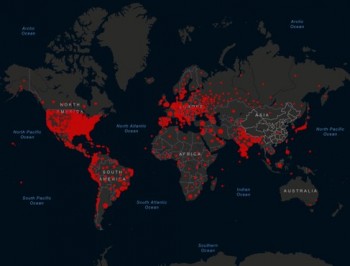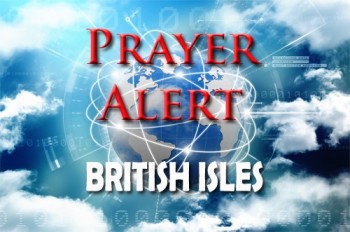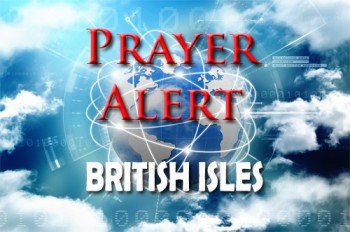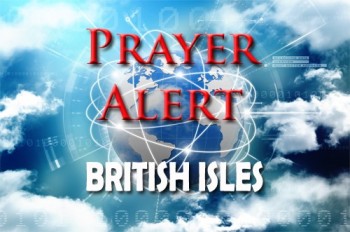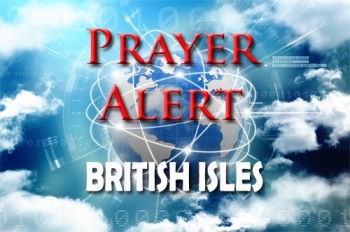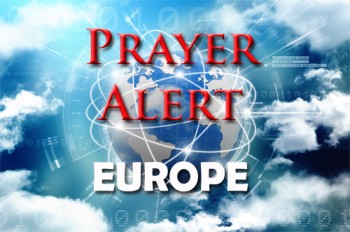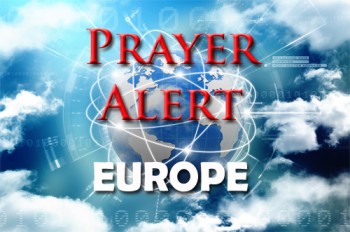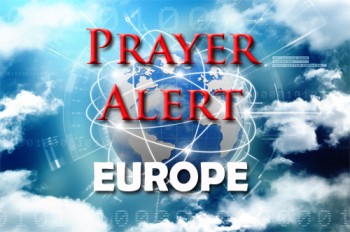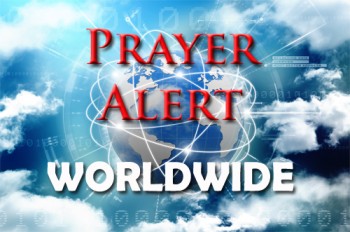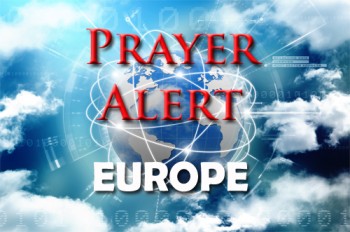Displaying items by tag: Covid19
Covid-19 Pandemic Prayer Update – June 2021
A mid – June prayer report looking at the opportunities and challenges of vaccinations, Covid-19 Hot Spots and some suggested Prayer Pointers with links to resources:
As of 13th June, the total global figure for people infected by Covid-19 stood at 175.7 million according to Johns Hopkins University. In addition to this, the recorded number who have died totalled 3,796,642. From a peak of worldwide daily cases in early January, numbers declined steadily until mid-February when they started to rise again, more recently exceeding the January peak.
Covid-19 hot spots
Here are those countries / regions which are currently showing high levels of infection.
The devastating wave of infections that overwhelmed India does appear to be slowing. India is the second worst-hit country in the world by the pandemic after the United States. The overall case count officially now stands at 29,439,989 cases, and 370,407 deaths although many fear it may be 5 or 6 times higher than this. The devastating second wave that engulfed India, one of the worst experienced by any nation, may finally have abated, but trauma and death has been left in its wake. There was barely a family in India left untouched by the virus, and with Covid hitting adults much worse than children, it has resulted in thousands becoming orphans in the past few weeks.
Brazil continues to see great suffering in 2021. Cases have increased since early February, peaking at the start of April at over 100,000 per day. The current daily average of 75,778 cases per day is slowly declining, but still exceeds that of the first wave in July 2020. Total cases have exceeded 17.3 million with 486.358 deaths. Having peaked at 4249 daily deaths on 8th April, the figure still remains high with over 2008 daily deaths still being reported. Whereas many countries have seen sharp declines following a peak, Brazil has been much slower at reducing cases and deaths over time.
South America continues to experience some of the highest levels of death due to COVID. Over the week 6th-13th June, Paraguay, Uruguay, Argentina and Colombia have all experienced some of the highest levels of death relative to population size, although thankfully cases are declining in all of these countries.
The US continues to be the country with the highest number of confirmed cases and deaths related to Covid-19 with figures at around 34,315,873 and 614,955 respectively. Thankfully the daily infection rate has fallen dramatically from a 7 day rolling average high point of nearly 250,000 cases in early January to just over 16,000 cases mid-June (John Hopkins) and daily deaths were reported as 308 on 13 June .
Cases in European countries are relatively stable, having declined over the last 6 weeks in most countries. There are signs of small rises in Russia and the UK amidst debates about the speed of easing restrictions and the possible impact of new variants.
New waves and Variants
New variants of COVID 19 continue to be the source of discussion and focus, not least as their interaction with the vaccination programmes and new waves of infection become a greater priority. The World Health Organisation have recently introduced a new naming convention for variants of Interest (VOI) and variants of concerns (VOC). "No country should be stigmatized for detecting and reporting variants," Maria Van Kerkhove, WHO's technical lead for Covid-19 response, wrote in a Twitter post. Rather, a WHO expert panel recommends using Greek alphabet letters to refer to variants, "which will be easier and more practical to discussed by non-scientific audiences," WHO says on a new webpage on its website.
The P.1 variant, first detected in Brazil and designated a variant of concern in January, has been labelled "Gamma." The B.1.617.2 variant, first found in India and recently reclassified from a variant of interest to variant of concern, is "Delta." Variants of interest have been given labels from "Epsilon" to "Kappa."
This New York Times article provides a useful and detailed analysis of the nature and scientific understanding of variants. Some countries, like the USA have been fortunate in avoiding the rapid spread of variants whereas others, such as the UK, have been affected more significantly. Thankfully, current variants do seem to be suppressed by effective vaccine rollouts, particularly when 2 doses have been administered. Dr Anthony Fauci urged everyone who has received the first dose of the Pfizer or Moderna vaccines to make sure to sign up for a second. "And for those who have still not been vaccinated yet, please get vaccinated.” He said vaccination is the best way to protect yourself and to stop this variant from spreading and becoming dominant in the U.S.
There has been much recent focus on the ‘Delta’ variant B.1.617 that was first detected in India in October. This is a concern because there is evidence that the risk of hospital admission is higher in people with the delta variant. Data also indicate that the variant is spreading rapidly through England’s schools. Public Health England has said the Delta (Indian) variant is 64% more transmissible than the Alpha (Kent) variant indoors and vaccines are less effective against it.
Vaccines
The vaccination programme remains the most likely vehicle for ending the pandemic. As of late April, more than 2.36 billion vaccine doses have been administered worldwide, with 12.2% of the world population having received at least one vaccine dose. Vaccines have now been administered in approximately 180 countries. Vaccines remain concentrated in high income countries - about 51% of people who have received at least one dose of a coronavirus vaccine were from high income countries, and at least 48% were from Europe and North America, yet these countries only represent 16% of the world’s population. Because of the limited availability of vaccines, most countries are prioritizing certain groups of people to receive their shots before others. People who are older or more likely to become very ill or die from COVID-19 are usually prioritized over those who are young and healthy. Some groups are prioritized because they are more likely to come into contact with an infected person based on what they do or where they live and, in turn, infect others.
Vaccine inequality remains a serious and potentially worsening problem. From Africa to Latin America, Asia and the Caribbean, the same issues have been replicated. On top of finding enough doses, there have been logistical difficulties with delivery, problems over healthcare infrastructure and, in some countries, public hesitancy towards vaccines.
Africa’s lack of vaccines – and the erratic supply of those that are eventually delivered – remains a major challenge. Only 28 million doses have been delivered on the continent so far – that’s less than 2% of the continent’s population – at a time when some wealthier countries have vaccinated well in excess of half their populations.
In terms of approved vaccines, the RAPS website provides a good overview of the current situation. There are currently 16 vaccines with some form of regulatory approval, of which 7 are being used widely across the world. 9 new vaccines are currently in Phase 3 trials, with a further 7651 in earlier stages of development. This is unprecedented and something we should all give thanks for, not least when considering the partnership work between scientists, public and private organisations, which is a source of great optimism.
Moderna and Pfizer have released data suggesting that their vaccines are well tolerated in adolescents and highly effective in preventing COVID-19. Canada, the US and the EU have already authorised the Pfizer vaccine in children as young as 12, and the UK has just approved the use of the Pfizer vaccine in children aged 12 to 15. However, there is a much debate as to the benefit of vaccinating children in rich countries, particularly when so many more vulnerable people in the world remain unvaccinated.
Political Leadership
The G7 summit of world leaders has just finished and placed COVID at the centre of its discussions. In particular they focused on worldwide vaccination supply, but also economic recovery from the pandemic. The group agreed to donate 1 billion doses to poorer nations, something welcomed by UNICEF who said “We welcome the commitment this week by leaders of G7 nations to accelerate the rollout of safe, effective, accessible and affordable vaccines for the poorest countries, with a goal toward ending the pandemic in 2022. Equitable access to COVID-19 vaccines represents the clearest pathway out of this pandemic for all of us — children included, and commitments announced by G7 members last week are an important step in this direction.” Others however have said that the group lacked ambition, highlighting that 12 billion vaccines would be needed worldwide, and a lack of clarity as to how the promised vaccines would be delivered.
Let’s Pray… Let us continue to declare that the novel coronavirus is defeated by the blood of Jesus.
We pray for divine intervention and for God's name to be glorified even as each nation and government tries its best to prevent or control the emergence of new waves of infection and finally arrest this epidemic.
We pray that individuals, leaders and nations focus on the needs of others rather than themselves, and that cooperation and compassion lie at the heart of the world’s response to the crisis.
We pray for our scientists. In particular we pray for those assessing and communicating risks associated with vaccines, that they be filled with wisdom and understanding. We pray too for those investigating, sequencing and analysing new variants.
We pray especially for the nation of India. We stand with our brothers and sisters who are living amidst this uncertainty. We pray comfort for those who suffer and their families, and resilience for those providing medical support in the most difficult of times.
We release wisdom, skill, and integrity upon our leaders, particularly as they grapple with the complexities, challenges and many voices that seek to influence them.
We pray that leaders and nations will see their moral duty to the world’s poorest and most vulnerable people and back this up with action not just words.
We pray for protection, wisdom and strength, for those working to bring treatment and comfort to the sick and their families.
We pray for individuals struggling to decide whether to receive the vaccine. We ask that their fears be settled and that the information they receive be truthful and honest.
We pray special grace and help for the vulnerable and lesser-developed nations.
We pray for a safe, effective, and affordable vaccine to be released soonest and the continued development of a range of vaccines to supply the whole world
We continue to release faith, hope, and love over the peoples of the world. May the Church seize this opportune time to manifest Jesus our Lord and Savior to those who are seeking answers and peace.
Young people driving Covid growth
On 16 June Parliament rubber-stamped extending lockdown rules in England until 19 July. Scientists say Covid is growing - with much of it being driven by younger people who are not yet immunised. However, tentative signs in the latest daily data suggest growth may be beginning to slow. The rollout of vaccinations to younger people is key to reducing further spread. Rising infections have boosted a seven-day average to 7,888 cases. The UK recorded 9,055 cases on 16 June - the highest number since 25 February. Hospitalisations have also increased, but daily deaths remain low, with a weekly average of nine deaths within 28 days of a positive test. The Government has clearly announced that it wants to vaccinate all adults in the period between now and 19 July. That will make a very big difference and increase the overall population immunity.
Truth in the pandemic
Justin Welby said, ‘The world is facing a crisis of truth. Claims and counterclaims about the virus, vaccines and the effectiveness of government responses take centre-stage globally. Conspiracy theories circle the globe; misinformation causes repercussions. We need to learn to judge the information we receive, think critically and kindly, and act accordingly.’ There has been a rise in conspiracy theories, anti-vaccination campaigns and growing confusion as people question whether Covid-19 is really a threat. Social media stand accused of spreading misinformation faster than reliable facts and corrections. Is the vaccine safe? Are the statistics accurate? How likely am I to get Covid? The postmodern idea of all truth being relative falls far short of the mark when the truth can save your life.
2021 housing crisis
A lack of effective and sustained government action and funding is partly to blame for a crisis in the quality of England’s homes, according to a new report entitled ‘Past, present and future: housing policy and poor-quality homes’. It finds that while the government has a crucial role in protecting the nation’s housing stock, dramatic funding cuts and failure to act have left England’s homes crumbling. Today, an estimated ten million people in England are at risk because they live in a home which doesn’t meet basic standards, with the majority of these homes posing a serious risk to their inhabitants’ health or safety. Previous research by the Centre for Ageing Better and the King’s Fund highlighted the link between poor-quality housing and Covid-19; those who are most at risk of the disease are more likely to be living in non-decent homes.
Covid variants and booster debate
A leading scientist and member of SAGE says the lockdown easing in June ‘could be delayed', as Indian variant cases are increasing in UK hotspots. Vaccine developers are asserting we will need annual boosters or new vaccines to tackle variants, but some scientists are questioning whether this will be needed. When Pfizer said people could need annual boosters, the ex-director of Centres for Disease Control and Prevention said there is no evidence to suggest that this is the case. Scientists said anticipation around the need for boosters is being set by pharmaceutical executives not health specialists, though ‘preparing for such a need as a precaution was prudent’. The director of WHO’s department of Immunisation said, ‘We don't see the data yet that would inform a decision about whether or not booster doses are needed.’
Netherlands: Calvinists refuse vaccines and social distancing
In the Netherlands, Protestants make up around 16 percent of the population. A small group of traditional Calvinists are opposed to vaccination and social distancing. Most of these believers, who live in a region known as the ‘Bible Belt’, were never vaccinated as children and are opposed to the idea of injecting sickness into a healthy body. Despite surging case numbers, they continue to attend Sunday services without face masks. But amid some of the country's highest Covid-19 infection rates, some of them are starting to shift their mindset.
Europe: Indian Covid variant in seven countries
The Covid variant behind a devastating surge of infections and deaths in India has been detected in many European nations. Data obtained from the European Centre for Disease Prevention and Control showed that the B.1.617 variant - also known as the Indian variant because it was first detected there - has now been found in Belgium, Germany, Ireland, the Netherlands, Switzerland, the French Caribbean island of Guadeloupe, and the UK. On 21 April the UK had detected 132 cases, the most of any European country. The other European countries have observed fewer than ten cases each, though this may be due to different levels of testing. See also the world article ‘India: Covid crisis’.
EU: Covid vaccination challenges
Many are now saying the vaccination rollout has been plagued by bureaucracy, poorly-negotiated contracts, penny-pinching, blame-shifting, and secrecy. The result is a shortage of vaccines, and an immunisation crisis On 17 February Brussels announced it is now set to almost triple its orders of Moderna’s coronavirus vaccine as part of an EU push to respond to the emergence of new variants and the possible need for booster shots. Deliveries under the new deal are unlikely to ease the current short-term vaccine supply squeeze but it would be delivered between April and June.
China: ‘more painful than death’
23 January marked a year since the coronavirus lockdown chaos in Wuhan City when 11 million people were isolated for 76 days as authorities tried to contain the spread of a virus that overwhelmed hospitals and emptied streets. Many now fear it could happen again. China announced sanctions less than half an hour after US president Joe Biden took office. A year on, Yue, a Wuhan resident, said he had almost forgotten the chaos in the early days of that long quarantine, but new outbreaks in Hebei in the north of the country - where millions are again in lockdown - brought it all back. ‘The most miserable thing wasn’t death itself. Trying to get medical treatment was more painful than death. Chinese people have a strong capacity to endure disasters. I survived the Great Famine,’ he said, referring to the catastrophe between 1959 and 1961 that claimed at least 45 million lives.
Europe’s Covid Christmas
Across Europe there will be further lockdowns, curfews and travel bans as the number of people infected with Covid has increased. Italy’s prime minister Giuseppe Conte summed it up when he told Italians to expect a ‘more sober Christmas, without Christmas Eve gatherings, hugs and kisses’. We can pray for people to honour the various restrictions on public gatherings and to obey curfews where they have been imposed. Pray particularly for friends and families to exercise restraint on Christmas Eve and New Year’s Eve. Pray also for countries which will be easing restrictions prior to Christmas; may the public act wisely to avoid any further unnecessary sickness and deaths. See The EU drug regulator will meet on 21 December to decide whether to authorise the jab after desperate EU countries said the agency risked losing the trust of EU citizens if it did not act fast.
